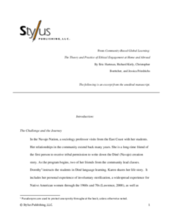This book gathers and develops theoretical insights and practical tools to support ethical global learning through community-campus partnerships like those described in its pages. The authors draw on research and insights from several academic disciplines and community partner perspectives along with decades of applied, community-based development and education experience. The book warns of the "perils" of global service learning (GSL), stating "Some efforts to engage in GSL – or at least international volunteering – have been reckless, harmful, and rightly criticized (Arends, 2014; Ausland, 2010a, 2010b; Illich, 1968; Holligurl, 2008; Larsen, 2015; Madsen-Camacho, 2004; Zemach-Bersin, 2008). Clear evidence indicates that these poor forms of programming have negative impacts on vulnerable persons, including medical patients (Evert, 2014; Lasker, 2015) and children (Punaks & Feit, 2014; Richter & Norman, 2010), while cementing stereotypes (Arends, 2014; Nelson, 2010; Hartman, 2017), and reinforcing patterns of privilege and exclusion (Andreotti, 2014; Crabtree, 2008). Important criticisms will be considered and discussed in the chapters that follow."
These perils include the harms brought on by orphanage volunteering. "Particular categories of international volunteering have emerged as practices that should never be engaged, such as orphanage volunteering," say the authors. "A global movement of child rights professionals has organized to stop orphanage volunteering, which is harmful to vulnerable children in numerous ways, including heightened risk of abuse, increased likelihood of institutionalization until adulthood, and repeated experiences of abandonment."
The authors argue that these perils can be mitigated "through collaborative planning, design, and evaluation that advances mutually beneficial community partnerships, critically reflective practice, thoughtful facilitation, and creative use of resources."
Read an excerpt of the book by clicking the thumbnail image above. Access the full book here.

